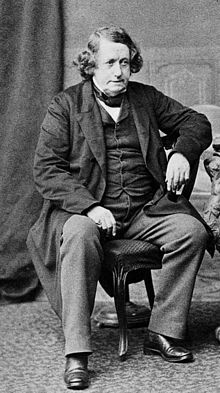Hugh Falconer
| Hugh Falconer | |
|---|---|

Hugh Falconer
|
|
| Born |
29 February 1808 Forres, Scotland |
| Died | 31 January 1865 (aged 56) London, England |
| Residence | Scotland, India, England |
| Citizenship | British |
| Nationality | Scottish |
| Fields | Geology, Botany, Paleontology |
| Institutions | Saharanpur Botanical Gardens Calcutta Medical College Agric. Hort. Soc. Bengal |
| Alma mater |
University of Aberdeen University of Edinburgh |
| Doctoral advisor | Robert Jameson |
| Known for | punctuated equilibrium |
| Notable awards | Wollaston Medal 1837 |
Hugh Falconer MD FRS (29 February 1808 – 31 January 1865) was a Scottish geologist, botanist, palaeontologist, and paleoanthropologist. He studied the flora, fauna, and geology of India, Assam, and Burma, and was the first to suggest the modern evolutionary theory of punctuated equilibrium. He was the first to discover the Siwalik fossil beds, and may also have been the first person to discover a fossil ape.
Falconer was the youngest son of David Falconer of Forres, Elginshire. In 1826 Hugh Falconer graduated at the University of Aberdeen, where he studied natural history. Afterward, he studied medicine in the University of Edinburgh, taking the degree of MD in 1829. During this period he zealously attended the botanical classes of Prof. R. Graham (1786–1845), and those on geology by Prof. Robert Jameson, the teacher of Charles Darwin.
Falconer became an assistant-surgeon on the Bengal establishment of the British East India Company in 1830. Upon his arrival in Bengal he made an examination of the fossil bones from Ava, upper Burma in the possession of the Asiatic Society of Bengal. His description of the fossils, published soon afterward, gave him a recognized position among the scientists of India. Early in 1831 he was posted to the army station at Meerut, India, in the North Western Provinces.
...
Wikipedia
